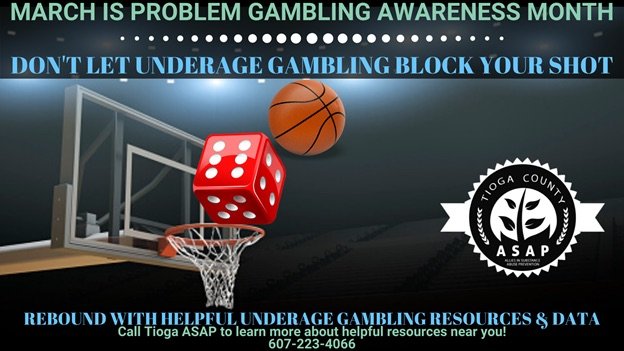Did you know that video gaming can lead to problem gambling? The danger comes from a feature most popular video games have built into them – “loot boxes.” A loot box is a virtual box a player can buy in a game with real or pretend money with the chance of getting virtual weapons and other upgrades to help the chances of winning the game or the ability to customize characters. Gambling addiction can trigger financial harm, emotional difficulties, poor work or school performance, poor mental and physical health, depression, substance abuse and suicidal behavior.
Kids need to understand facts from rumor, as well as minimum age limits and the potential consequences for underage illegal gambling. Even though kids under 18 are prohibited from gambling, they will still find creative ways to bet, such as video game gambling. In fact, did you know that 23 percent of Tioga County youth surveyed reported they have gambled for money in the past year? Many kids witness their parents openly place bets and immediately assume that gambling is a safe way to make money.
Like with alcohol and drugs, children see people they respect engaged in these activities and think it is acceptable. Families where the parents gamble are twice as likely to have an at-risk adolescent gambler and four times as likely to have an adolescent person with a gambling problem.
A parent’s attitude about gambling can affect a child’s attitude about it. If a parent sends the message that gambling is not a big deal, then kids and teens are more likely to have those same beliefs. Teens who gamble excessively report that they first started gambling with family members. There is a clear connection in the research between family history of gambling and adolescent gambling.
How can a parent tell when gaming has stopped being simple entertainment and becomes an addiction? Here are a few of the key warning signs to watch for:
* Neglect of other hobbies or friendships
* A decline in personal hygiene or grooming
* Unable to set limits on how much time is spent gaming
* Signs of irritability, anxiety, or anger when forced to stop gaming, even for brief periods of time
* The need to spend more time playing games or to play more intensely in order to get the same level of enjoyment
* Loss of appetite, sleeplessness, agitation, or emotional outbursts if the game is taken away
* Using video games as a way to escape stressful situations at work or school, or conflicts at home
Youth gambling addiction is growing. Kids who gamble are three times as likely to get in trouble with the police, 50 percent are more likely to drink alcohol, and are three times more likely to use illegal drugs. Clearly, gambling addiction is not just an adult problem.
What can you do about it?
Remember that kids watch what we do. Children are more likely to gamble if they see adults gambling. So, make sure what you’re doing is modeling healthy behavior.
An important talking point with kids is that although some things are legal, they aren’t always safe and it’s not something that is a “healthy alternative” to alcohol or drug use. For example, we know that cigarettes increase the chance to develop cancer even though cigarettes are legal to purchase for individuals 21 and older.
Another important talking point is that although gambling looks like fun, it can turn very serious quickly.
As gambling becomes more mainstream, parents, teachers and coaches will need to help steer the conversation so that kids become fully aware of the potential dangers associated with gambling. Like alcohol and drugs, it isn’t one conversation that does the trick. Bring it up in casual conversation and keep talking.
To learn more about preventing youth gambling problems, call Tioga ASAP at (607) 223-4066, visit www.tiogaASAP.org, or find them on Facebook @TiogaASAP.



Be the first to comment on "Guest Editorial: March is National Problem Gambling Awareness Month"